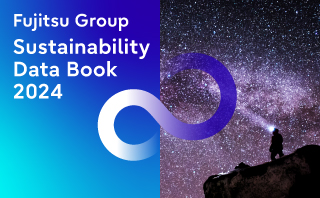-
Sustainability at Fujitsu Group
- Sustainability Management in the Fujitsu Group
- GRB(Global Responsible Business)Goals for FY2025
- GRB(Global Responsible Business)Goals and Achievments for FY2022
- Fujitsu's accessibility
- Stakeholder Engagement
- United Nations Global Compact
- SDG-related Activities in Fujitsu
- External Recognition and Awards
-
Global Responsible Business
- Environment
-
- Environmental Management
- The Fujitsu Group Environmental Vision on Climate Change
- Living in Harmony with Nature (Conservation of Biodiversity)
- Environmental Action Plan
- Environmental Data
- Environmental Communication
- Environmental Social Activities
- Disposal and Recycling of ICT products
- Environmental Considerations in ICT Products
- Governance
-
Data and Documents
- Fujitsu Group Sustainability Data Book 2024
- Social, Governance and Environmental data
- Independent Assurance Report

- GRI Standards / United Nations Global Compact (UNGC) principles Comparison Table
- SASB Standards Comparison Table
- Sustainability Information Disclosure Framework
- Link to regions responsible business reports
- Contact
- Sitemap
Stakeholder Dialogue 2022
Purpose-Driven Management Enters a New Phase:
Strategies for Sustainable Growth and Enhanced Corporate Value in the Medium to Long Term
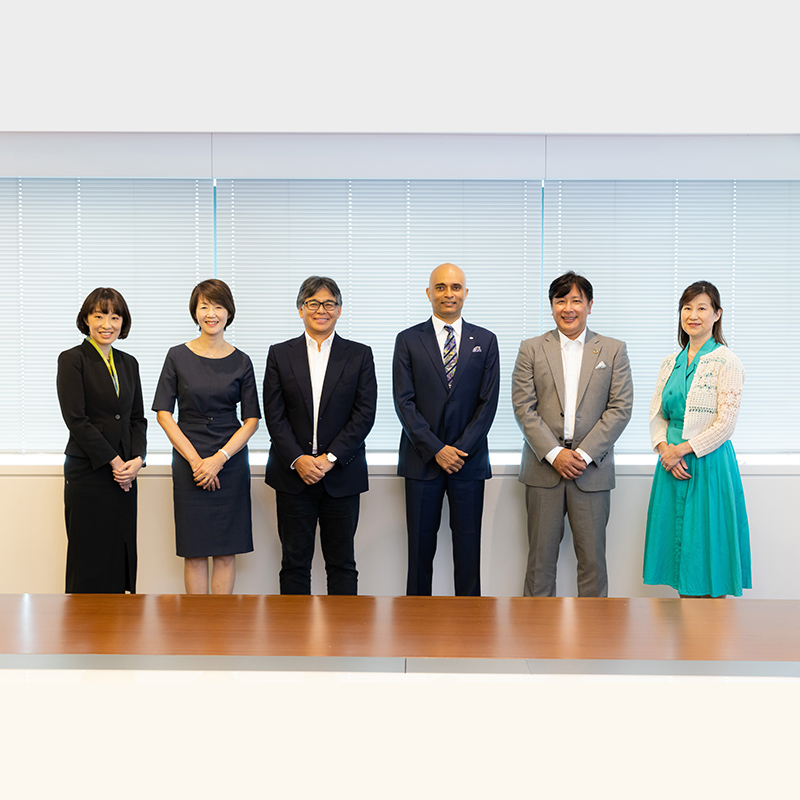
The Fujitsu Group has engaged in dialogues since 2010 with a variety of external experts in order to reflect stakeholder opinions in management decisions. In August 2022, we exchanged views with two experts in a dialogue with the theme of “Purpose-Driven Management Enters a New Phase: Strategies for Sustainable Growth and Enhanced Corporate Value in the Medium to Long Term”.
Experts
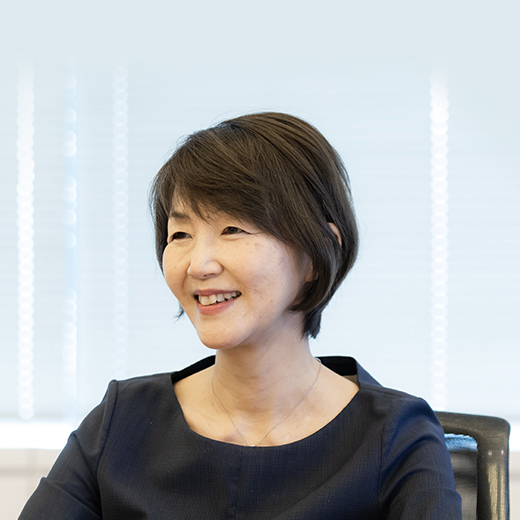
Yumiko Noda
Chairman and Representative Director
Veolia Japan K.K.
After working at the Long-Term Credit Bank of Japan (in Head Office and the New York and London branches), became a partner at PwC, driving the creation of the private finance initiative (PFI) market in Japan and working to solve urban problems in Japan and abroad. Following periods serving as Deputy Mayor of the City of Yokohama and others, was appointed President and Representative Director of Veolia Japan K.K. in 2017, assuming the current position in 2020. One of the objectives at Veolia is to achieve a circular economy in Japan with a focus on water, waste, and energy. Also concurrently serves in numerous other roles including Vice Chair of the Board of Councillors and Chair of the Committee on Environment of Keidanren (Japan Business Federation), External Director of Idemitsu Kosan, and External Director of Benesse Holdings.
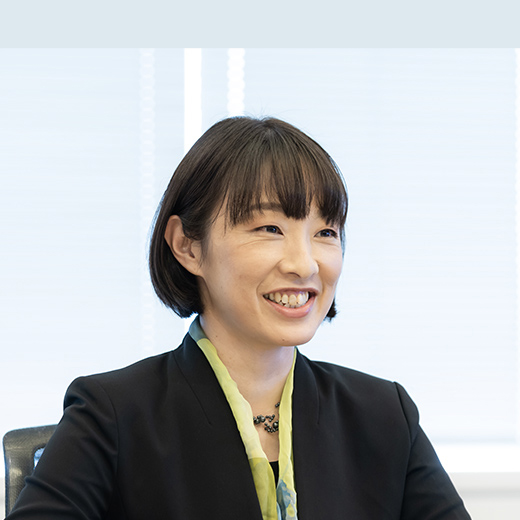
Kaoru Kobu
Head of ESG
Japanese Equity Investment
Invesco Asset Management (Japan) Limited
Joined Invesco Asset Management (Japan) Limited after working at JP Morgan Securities Japan Limited and JP Morgan Asset Management Japan Limited, assuming the current role in 2014. As a Research Analyst in the Japanese Equity Investment, covers the technology and finance sectors. As Head of ESG, oversees stewardship activities in the Japanese Equity Investment, including the formulation of voting policy, engagement with portfolio companies, and information disclosure, while also collaborating on a global level.
Fujitsu
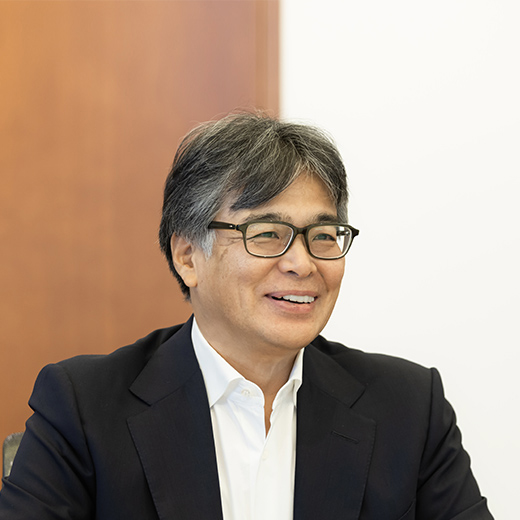
Takahito Tokita
Representative Director, CEO, CDXO
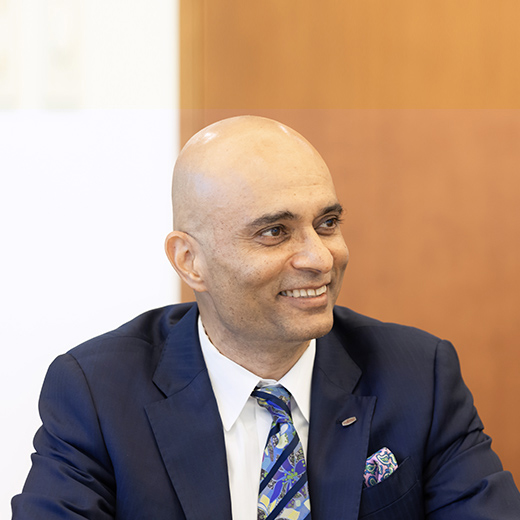
Vivek Mahajan
Corporate Executive Officer, SEVP, CTO
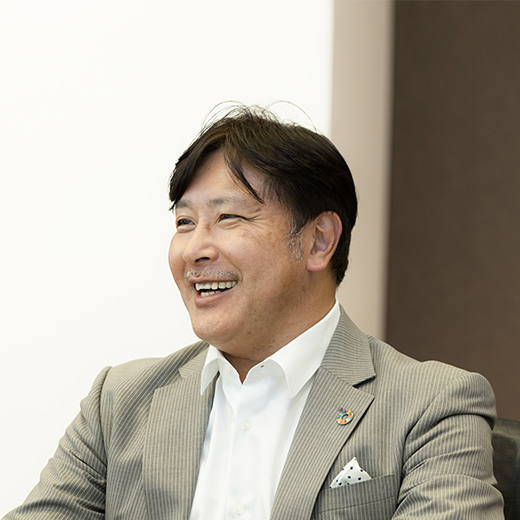
Shunsuke Onishi
Corporate Executive Officer, SEVP, Head of Global Customer Success
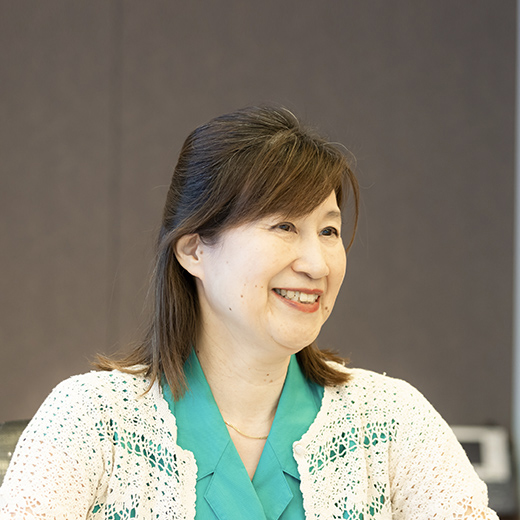
Yumiko Kajiwara
Corporate Executive Officer, EVP, CSO
Self-Introduction and Recognition of Issues
Takahito Tokita, CEO, CDXO:
The Fujitsu Group is currently developing Fujitsu Uvance as a set of global solutions to resolve societal challenges. Fujitsu Uvance consists of four cross-industry business areas aimed at overcoming issues facing society and three underlying technology areas that support them. The entire corporate group is unified in working to deliver this to customers around the world and thereby realize Our Purpose, which is to make the world more sustainable by building trust in society through innovation.
Vivek Mahajan, CTO:
I was appointed CTO and joined the company in 2021. Under the Fujitsu Uvance business brand, the Fujitsu Group is currently focusing on five key technologies that are essential for DX. Our initiatives in these five areas place great importance on sustainability and making a valuable contribution to society. For example, our research into next-generation processors has set a performance target of reducing power consumption to one-tenth of the conventional KPI. To achieve this goal, our research expenses will rise but we are confident that this effort will generate significant value for society and will also lead to positive business outcomes in the long term. Fujitsu aims to create innovative proposals with an emphasis on sustainability and a long-term focus, while working together with customers to overcome societal challenges.
Shunsuke Onishi, Head of Global Customer Success:
My role as the Head of the Global Customer Success Business Group is to oversee the delivery of Fujitsu Group solutions to large customers with global scale operations. Tokita-san referred earlier to the four cross-industry business areas in Fujitsu Uvance, and I am responsible for one of those areas – Sustainable Manufacturing. The IT sector has been typified in the past by customer relationships built on a model of “order placement and order fulfillment”. I feel it is necessary to move toward partnerships where we create ecosystems together and collaborate to solve challenges. Although it will not happen overnight, to achieve this goal we believe it is vital to spur innovation in the customer-interfacing units and to also transform the business model itself.
Yumiko Kajiwara, CSO:
As Chief Sustainability Officer (CSO), I am responsible for promoting the practice of sustainability management. Sustainability is an essential element of the Fujitsu Group's operations and is now developing into a source of growth for our business. In this context, I collaborate with units on the frontlines of our business to consider the types of proposals we can offer to customers, as we play a supporting role in ensuring that we provide value to keep our customers one step ahead of the competition. We also work to strengthen the connections between sustainability and our business through ongoing dialogue with customers.
Yumiko Noda, Veolia Japan K.K.:
Veolia has its origins in a company founded in France in 1853. Starting out with the supply of drinking water, an essential element for public health and quality of life, the company now operates with a focus on water, waste, and energy. In 2019, the Veolia Group defined its purpose as “to contribute to human progress by firmly committing to the Sustainable Development Goals set by the UN to achieve a better and more sustainable future for all.” With this purpose at the center of all our activities, we conduct our business operations to deliver value to, and meet the expectations of, our five categories of stakeholders: the planet, clients, shareholders, employees and society.
Kaoru Kobu, Invesco Asset Management (Japan) Limited:
I have been covering the technology industry as a buy-side analyst since 2000. The past two decades or so has been a very turbulent period for the technology sector. Fujitsu is recognized today as being a leading example of a sustainability company in the technology industry. As a long-term active investor, we consider ESG information to be extremely important from the perspective of investment decision-making and portfolio risk management. In recent years, together with the focus on ESG, I believe that dialogue between companies and investors has been increasing. Constructive dialogue does not mean that companies and investors are at odds with each other, but rather it is a necessary process for them to share the same direction over the medium to long term.
The Importance of Visualizing Sustainability
Kajiwara:
Companies today are being asked to address sustainability as a core element of their business. As the world faces growing challenges from issues such as climate change and mounting inequality, it is increasingly important to develop business strategies that take a medium- to long-term perspective while also factoring in risks and opportunities. Given this situation, I would like to begin our discussion by looking at the areas that companies must address.
Tokita:
The Fujitsu Group is promoting Fujitsu Uvance with the aim of helping to create a sustainable world by working to resolve problems from a medium- to long-term perspective. We want to provide communities with the technology needed to address the societal challenges we now face. But this is more than just the obvious technologies and tools. We think it is also extremely important to use data in ways that make things “visible”.
Kobu:
From the standpoint of investors, we are also strongly focused on “visualizing non-financial intangible value”. The results of an annual survey conducted by the Life Insurance Association of Japan*1 showed that investors are focused on medium- to long-term investment and financial strategies that invest in intangible assets, such as IT, R&D, and human capital. Long-term oriented investors are attracted to the creation of non-financial value. Given a background where the failure of Japanese companies to attain their financial goals has eroded faith in those same goals, there has been increasing attention paid to non-financial information in that it raises the level of trust in capital markets in terms of medium- to long-term management strategy. However, research*2 has suggested that the widespread disclosure of non-financial information could make evaluations more varies and unreliable. This is precisely why we think it is important to have more in-depth conversations about non-financial information and sustainability and to elevate visibility in the market.
- *1“Initiatives by Life Insurers to Reinvigorate the Equity Market and Achieve a Sustainable Society through Asset Management~Checking Corporate and Investor Awareness of the Impact of the Novel Coronavirus Pandemic, Carbon Neutrality and More~”, Life Insurance Association of Japan (seiho.or.jp), 2022 news release
- *2“Why is Corporate Virtue in the Eye of the Beholder? The Case of ESG Ratings” by Dane M. Christensen, George Serafeim, Anywhere (Siko) Sikochi :: SSRN
“Purpose” as an Essential Element in Forming Partnerships
Kajiwara:
Forming partnerships is increasingly important in promoting sustainability-driven businesses. For example, to realize a carbon-neutral society, it is essential to form partnerships that surmount the barriers between industries to quickly build up efficient supply chains. Companies must also work with partners that will enable them to leverage the synergies of collaborating with other firms in the same industry, as well as tie-ups with industry, government, and academia.
Mahajan:
A single IT company can provide a customer with a simple system. However, if we are aiming to resolve societal challenges or achieve a green transformation, we need a collaborative business ecosystem with a value chain comprising various companies and organizations that transcend specific industries and sectors. I believe this is the only way to truly create value for society.
Noda:
To achieve a carbon-neutral society, it is essential that we convert to a circular economy. A circular economy is one in which the entire value chain – from design, manufacturing, and consumption through to disposal and recycling – is circular. The changes required are nothing short of revolutionary. Digitalization is needed to “visualize” the circularity, to “connect” the players involved, and to “transfer” the operations for optimum efficiency. A circular economy cannot be achieved without digitalization and, as an enabler, I believe Fujitsu will play a critical role. There is great promise in bringing together the “arterial industries” that create products and the “venous industries” that collect, recover and reuse waste, as well as in connecting consumers and governments with corporations.
Onishi:
In terms of global partnerships, there are no partners out there whose values perfectly match those of Fujitsu. Even among those with a match of around 60%, I think the important thing is to build relationships based on an understanding of mutual strengths. However, I believe that this is an area where Japanese companies, including Fujitsu, do not particularly excel. Overcoming this hurdle is the first step toward forming effective partnerships.
Tokita:
Typically, in the Japanese business world companies that are perfectly matched as partners set up a solid foundation before commencing operations. This means they often lag behind when compared with European companies. Therefore, the best course is probably to start with a flexible, gradual relationship based on trust.
Noda:
I think that having a purpose is key to building that sort of flexible partnership. A purpose serves to link employees who work globally and is also important for forming partnerships across different industries. Sharing a common purpose can smooth out differences in opinions that arise at times, and it also enables you to find solutions that allow shared goals to be achieved with your partners. The Fujitsu Group has a clearly defined purpose, and the business strategy appears to be based on that purpose. In the future, when every employee also understands that purpose and can express it in their own words when talking to customers and business partners, they will surely be able to build even better partnerships.
Tokita:
Whenever I describe our company, I begin by talking about Our Purpose. As a result, I get a real sense that people, especially those from European companies, are more inclined to comment that they feel confident working with Fujitsu.
Kobu:
Speaking from the viewpoint of investors, we expect that corporate value can be enhanced on an ongoing basis by applying purpose management across the entire company and through all departments, and by ensuring that the direction of the management strategy is comprehensively shared. I think different purposes can be assigned to the various departments. For instance, the purpose for an R&D department might be new product development and technological innovation, while for a customer service department it might be improving customer feedback, and for a finance department it could be improving capital efficiency. The purpose for the overall company, however, should be aimed at growing its corporate value. One problem that is often cited is lack of penetration in communicating the purpose to employees and the difficulty of establishing the concept. A purpose is more than a simple slogan. Building structures that are aligned with the different incentives of each department and each employee and then applying those structures to actual behavior can be instrumental in growing corporate value.
Materiality in Business
Kajiwara:
The Fujitsu Group is currently undertaking a renewed analysis of materiality (a priority issue). How should the Fujitsu Group leverage materiality in its management and business strategy in the medium- to long-term?
Noda:
Materiality is what links management and business strategy to a purpose. It is vital that you take an integrated approach to your Purpose and materiality connected with management and business strategy. I imagine geopolitical risk is extremely important in your company’s approach to materiality. Russia’s invasion of Ukraine has brought the world to a major turning point. The deglobalization movement is progressing and there are also indications that society is becoming increasingly decentralized. Under such circumstances, I firmly believe that, as a Japanese IT company, Fujitsu should be aiming to provide value as a trusted partner.
Tokita:
Given the current geopolitical risks, finding ways to shoulder this responsibility is a key consideration for the Fujitsu Group, and I think the same is true for the issue of governance. To advance the business, I think it is extremely important to have the autonomy to make the correct decision based on your own judgment in reference to the Purpose, even if unsure whether the decision is correct or not.
Human Resources Strategies and Organizational Culture Change to Realize Our Purpose
Kajiwara:
In terms of our human resources strategy, the Fujitsu Group switched from a membership-type human resources management model to a globally consistent job-based model in April 2022. We are undertaking a program in which every Fujitsu Group employee will express their own purpose, and this process of clarifying their individual purpose gives employees the opportunity to think independently about their career. At the same time, we are expanding our posting system on a global basis, which allows employees to nominate their preferred job role and location.
Kobu:
Noda-san and I also have considerable experience with job-based employment arrangements from working in non-Japanese companies. I agree with Kajiwara-san’s point that, in a job-based system, people must think independently about their career. But I also believe that it can be challenging for employees to be constantly mindful of the process of responsibility for their own careers. Having said that, it is also true that by continually updating employees on your progress toward the Fujitsu Group’s human resources management and organizational reforms, you are helping to transform their understanding and behavioral patterns.
Onishi:
I think that many employees have no experience of career ownership and may feel a bit uncertain, but in the process of reforming our organization we should support career ownership by all staff.
Mahajan:
Since I joined the company in 2021, I have noticed a change in the organizational culture, including in the area of human resources management, and I think we are changing for the better as an innovative company. But what I would like to know in this context is this: What expectations do the two of you have for the Fujitsu Group as a global technology enterprise?
Kobu:
In a previous dialogue between the management and investors, I was impressed by the message embodied in Tokita-san’s words when he said: “Human resources strategy is the very first step in the structural reform of our business, and I will see it completed no matter what.” I get a real sense that, in Fujitsu, your business strategy and sustainability strategy are truly integrated. To raise the level of trust in capital markets with respect to further growth in your future corporate value, I am sure that there will be ongoing constructive dialogue with investors and other stakeholders.
Noda:
When implementing your human resources strategy, I would like to see you develop personnel who identify issues themselves and then seek out and communicate the solutions, rather than just doing their work passively. Above all, it is preferable to have personnel who can speak up and negotiate on the world stage where rules and regulations are determined. In Europe, many business representatives are participants at the table for international rule making, while in Japan it seems to be mostly academics and researchers, with little contribution from the business sector. International rules affect the future of corporate management. For Japan to step up into a leadership role, global companies with influence, such as Fujitsu, should be developing their personnel to play a part on the world stage.
Conclusion
Tokita:
Thank you both for your valuable feedback today. This has been an opportunity to broaden my awareness and learn a great deal. The Fujitsu Group initiated purpose management in 2020, and I can see that the true essence of purpose management is supporting every one of our employees to attain their individual purpose. We will incorporate the suggestions you have both made into our future management activities and will continue to rise to the daily challenge of meeting our stakeholders’ expectations.


